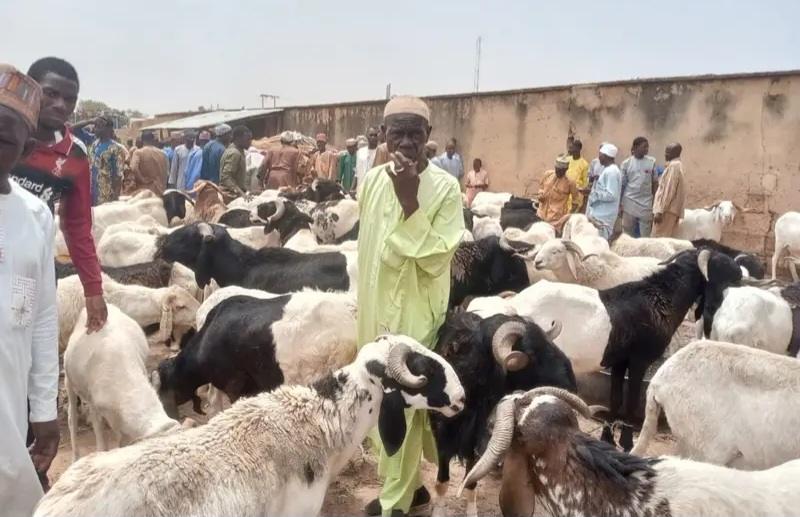As preparations intensify for the 2025 Eid-el-Kabir celebration, ram dealers at the famous Mai’adua International Livestock Market in Katsina State are expressing deep concerns over low patronage and declining prices, despite a noticeable scarcity of animals.
A News Agency of Nigeria (NAN) correspondent who visited the market on Sunday observed that the drop in activity is tied to the ongoing export ban imposed by the Niger Republic military government, which has prohibited the movement of livestock, including rams, cows, camels, and goats, across its borders into Nigeria.
This development comes despite the Nigerian federal government’s continued efforts to boost trade between both countries, including the multi-billion-naira Kano-Jigawa-Katsina-Maradi railway project. President Bola Tinubu, during a recent visit to Katsina, reaffirmed that the cross-border infrastructure project remains on track for completion by 2026 to enhance regional trade integration.
In stark contrast to the high expectations typical of the festive season, prices of rams have significantly dropped. A ram that sold for ₦1.7 million just a week ago now goes for about ₦1.2 million, while medium-sized rams that previously sold for ₦700,000 are now priced lower. Smaller rams are being offered from as low as ₦100,000, signaling a worrying trend for livestock traders.
Bashir Hassan, a prominent ram dealer from Niger Republic, confirmed that authorities in his country have issued strict directives forbidding the export of animals. He explained that the decision was partly driven by devastating floods in key regions such as Niamey, Maradi, and Tawa earlier in 2024, which resulted in massive livestock deaths. Fearing a severe shortage during the Eid season, the Nigerien government ordered security forces, immigration, and traditional rulers to intercept and confiscate any animals being moved across the border.
Hassan revealed that many traders have already had their livestock seized, contributing to the supply shortage seen at Nigerian markets. However, the drop in consumer turnout has surprised many, especially as demand typically surges in the days leading up to Eid-el-Kabir.
Read also:
- Middle East expresses strong interest in Nigeria’s livestock industry, says Minister
- Livestock development to unlock Nigeria’s Agricultural wealth- Minister
- World Bank initiative to modernize livestock production kicks-off in Taraba
Offering a different perspective, Alhaji Muazu Maifaru, another top livestock trader, noted that while the border ban heavily affects dealers from Niger, Nigeria itself still has enough large-scale farms to meet domestic demand and even support limited exports.
He further pointed out that despite political tensions, Nigeria continues to export agricultural products such as maize, pepper, mangoes, and rice to Niger Republic. “You’ll find Mangal rice in many Nigerien markets,” he noted, calling attention to the ongoing trade relations that persist in other sectors.
Maifaru urged the military authorities in Niger to reconsider their stance, warning that such restrictive policies could have long-term consequences for regional trade and the economic stability of border communities that rely on livestock commerce for survival.
As the Eid-el-Kabir 2025 festival draws nearer, the uncertainty surrounding ram supply and pricing may continue to cast a shadow over what is usually one of the most economically vibrant periods for livestock markets in northern Nigeria.





